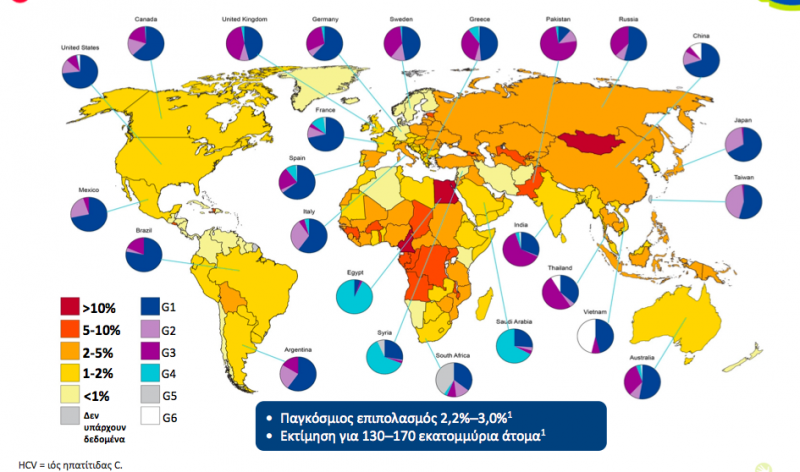Victoria Mindova
Less than a week ago, I received a disturbing email from an acquaintance of mine who works in the healthcare sphere. It read: "I am sending you an article to read. I do not know if you are interested in this, but the topic is very serious and will affect thousands of people who suffer from hepatitis in the country." An official announcement of the Union of patients with hepatitis in Greece called "Prometheus" was also attached to the email, which stated that the expert medical committee of the National Health Service has refused to continue the treatment of two Hepatitis C patients, although their condition have completely regressed after the end of the therapy.
Until then, I did not know much about Hepatitis C. All I knew was that Hepatitis A is the disease of dirty hands and a person can get ill because of poor personal hygiene. Hepatitis B is transmitted via a sexual contact, and Hepatitis C is transmitted mainly among drug addicts who share needles. Although my information was not incorrect, it was certainly not comprehensive enough.
It turns out that the hepatitis C virus has six different types and was found in the early 90's. Until then, blood that was used for transfusion was not tested for this virus. Therefore, after Hepatitis C was discovered, it was found that many people who had had blood transfusions had been infected. Until the beginning of this century, 80% of those who were infected in this way have been cured.
Currently, the majority of people who carry the virus are drug addicts. “If each addict uses only his or her syringe, the spreading of Hepatitis C can be stopped,” said the specialist who agreed to meet me and tell me more about the problem in Greece and about the disease itself.
"The union warned us about the case in which the two patients' treatment was stopped without medical reasons. These are people who want to be cured and meet all the criteria for free treatment. In fact, they have already been approved and started therapy, but the committee randomly stopped their treatment after the first part of therapy, probably due to budget cuts," said the woman.
In the past three years, Greece implemented the largest fiscal consolidation programme that has ever been imposed in countries of the Eurozone. Since 2010, the economic recovery has forced the governments to make deep cuts in public spending that have affected all the key items in the budget. The health system was also affected, of course.
The problem arose when, in the name of fiscal consolidation, the government threatened the physical survival of patients who have a chance to lead an adequate life, if they successfully complete their prescribed therapy.
The cost of treatment of people infected with Hepatitis C type G3 is 1,000 euro per month for half a year. The treatment of type G1 amounts to almost 3,000 euro per month and should last for a year.
Once the "Prometheus" union gave publicity to the case, private commercial and non-governmental organisations supported the appeal of patients for the restoration of free treatment. A few days after the issue became known the expert committee of the National Health Service refunded the treatment of the two patients.
In Greece, it is believed that of the about 200,000 people infected with Hepatitis C, only 4% know that they are carriers of the virus. Every year, between 10 thousand and 11 thousand people are infected with the virus. There are 400 deaths per year. Almost half of those infected with Hepatitis C carry type G1, which requires at least one year of therapy and is relatively less likely to be cured compared to G3. Hepatitis C type G3 is more amenable to treatment, and about 90% of infected people can be cured completely after six months of therapy.
"This is a silent disease. It is symptom-free, which makes it so dangerous." It is transmitted mainly through the blood - the use of shared needles, tattooing with unsterilized instruments or dental instruments that have not been properly cleaned, etc. "In general, people should know that they are likely to become infected if they use mutual sharp objects. You cannot get infected from social contact."
Sexual contact may also transmit the virus, but to a much lesser degree. Medical research has shown that the virus can very rarely be transmitted via a sexual contact between regular partners without protection.
In Greece, until recently, every Hepatitis C carrier without personal property (real estate or a car in his name) and a steady job was entitled to social assistance.
"Many of these people received social assistance, but did not want to be treated, because in most cases they are drug addicts and do not want to change their way of life. Now, the health insurance fund has changed the rules and social aid in the case of sickness is given only to those who want to be treated. This is a measure that was supposed to take effect many years ago, and not after the beginning of the crisis."
Between 2% to 3% of the world population or 150 million people are carriers of Hepatitis C. Every year, between three and four million people around the world are infected. Of these, 70% become ill and must take measures in order to be cured, since hepatitis usually becomes chronic. After the onset of infection, the virus settles in the body, but symptoms may not appear until the next 10 to 13 years.

Data: Centre for Disease Analysis; http:// www.kromite.com / hcv.htm.